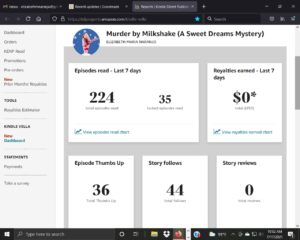
Image by Jill Wellington from Pixabay
Tropes are recurring character types and plot devices often specific to a genre or readership. They can be an important part of the genre’s identity and as comforting as a well-worn blanket to devoted readers. Some are non-negotiable; for example, a romance writer would be taking a big risk not to end with a happily ever after.
That said, we should write the books we want to read, and that often means shaking things up a bit and subverting tropes. When I began writing my young adult cozy mystery series, Sweet Dreams Mysteries, there were several YA tropes I knew right away I wanted to upend.
Romantic subplot (for the main character)
I can’t remember the last time I read a YA book that didn’t have a romantic subplot for the main character. When I envisioned my MC for Sweet Dreams, she was energetic, ambitious, and head-over-heels in love—with her job. Genevieve is a natural entrepreneur and wholly dedicated to her family’s ice cream shop. If she has time to daydream, she’s not pining over love interests, but creating new recipes. She has a fulfilling life with school, work, and her refreshingly platonic and drama-free friendship with BFF Brandon Summers. When thinking about the YA book I wanted to read, this was what I most needed: a girl who didn’t need a romantic relationship to complete her identity.
Dead parent(s) (or neglectful/abusive/clueless parents)
This one has been talked about to death (ha), but the trope is still so prevalent in YA fiction. The idea is teens need the adults out of the way so they can solve their own conflicts; therefore, there are many fatal car accidents (I’m guilty of it too). The fortunate parents who manage to survive in YA fiction are usually shockingly clueless or neglectful. For the Sweet Dreams series, I wanted to include a mother who loves her daughter but leaves her in the hands of a very capable father so she can pursue her dream career. As for my MC’s father, he can be a little overprotective at times, but he’s not an oaf, nor is he neglectful. Genevieve manages to solve her own problems perfectly well, even with a loving, well-adjusted dad who cooks her breakfast every morning.
Burning desire to break away from hometown
Maybe it’s my country roots; I grew up in Cheyenne, Wyoming, and spent years waiting tables in truck stops to the tune of country music, which romanticizes the charms of small-town life and strong family bonds. I wanted to write a YA book featuring a teenage main character who loved her hometown and didn’t want to leave. Genevieve is ambitious, but she’s perfectly content channeling her ambitions into the family business. She cherishes the tight-knit community in the small mountain town where she was raised, and when she pictures her future, it looks very much the same—creating new recipes and happily serving customers in Sweet Dreams Ice Cream Parlour. She can’t imagine living farther than a stone’s throw from her father or her beloved Aunt Mellie. So does this make her small minded? Not in my book.
Bookish main character
I get it; we write what we know, and for most of us what we know is a love for bookstores, libraries, and rainy days curled under a comforter with a hot beverage and a book. But I’m tired of reading this main character. For Sweet Dreams, I instead gave the above qualities to my MC’s BFF, a boy whose parents own a quaint downtown bookstore. Brandon is the bookworm, Brandon is the coffee lover, the quieter one, the one who loves reading on rainy days. Genevieve? She hates reading. She is bored by the very idea of lying idle on an afternoon, she’d rather poke her eyes out than engage in literary analysis, and she is an extrovert to the extreme. Her favorite place to be is not at home but in her brightly lit, cheerful ice cream shop, especially when it’s full of chatty customers. Like most writers I am an introvert through and through; I’d rather be home, I’d rather be reading. But I also get tired of reading about characters like me.




















Connect With Me